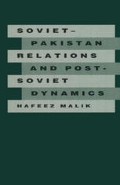Abstract
Since the birth of Pakistan in 1947, and especially through the 1950s, the leading decision-makers of Pakistan perceived threat primarily from India, and then to a lesser degree from Afghanistan. With both countries, the crux of the dispute revolved around territorial claims: Pakistan pressed a territorial claim over the princely state of Kashmir, which India was not prepared to concede; Afghanistan pressed self-determination for the Pashtuns (and even non-Pashtun ethnic groups) in the tribal belt, NWFP and Baluchistan, comprising almost 50 per cent of the territory of (West) Pakistan. The dispute with India had also acquired an ideological dimension, which was best stated by B. K. Nehru, India’s Ambassador to the United States in the 1960s: ‘The conflict between India and Pakistan is a basic conflict of ideology, as well as a conflict of power. And the nature of final settlement in Kashmir will have a profound effect on the ideology that is to prevail on that sub-continent and to some extent, the power relationship that will emerge.’1
Access this chapter
Tax calculation will be finalised at checkout
Purchases are for personal use only
Preview
Unable to display preview. Download preview PDF.
Notes
Selig S. Harrison, ‘Troubled India and Her Neighbors’, Foreign Affairs (New York: January 1965), Vol. 43, no. II, p. 319.
‘Appraisal of U.S. Military, Political and Economic Interests in South Asia’, prepared by the office of Near Eastern Affairs of the State Department for submission to the Sub-committee for the Near and Middle East of the State Army-Navy-Air Force Coordinating Committee, 1948, Records of the Military Advisor to the Office of Near Eastern and African Affairs, Record Group Number 59, National Archives, Washington, DC. See also an excellent collection of documents by R. K. Jain (ed.), U.S.-South Asia Relations (Atlantic Highlands, NJ: Humanities Press, 1983), Vol. II (Pakistan); also see for a tendentious discussion of US-Pakistan relations during early years,
M. S. Venkataramani, The American Role in Pakistan (New Delhi: Radiant Publishers, 1982), pp. 2–3.
George McGhee, Envoy to the Middle World: Adventures in Diplomacy (New York: Harper & Row, 1983), p. 47.
Dean Acheson, Present at the Creation: My Years at the State Department (New York: W. W. Norton, 1969), pp. 334–6.
C. L. Sulzberger, A Long Row of Candles: Memoirs and Diaries (Toronto: Macmillan, 1969), p. 526.
Liaquat Ali Khan, Pakistan, The Heart of Asia (Karachi: National Book Foundation, 1976), p. 24.
H. S. Suhrawardy, Statement on Foreign Relations and Defense (Karachi: Government of Pakistan, 1957), pp. 10–15.
Malik Firoz Khan Noor, Democratic Ideals and Foreign Policy of Pakistan (Karachi: Government of Pakistan, 1958), pp. 8–9.
For details on Britain’s and France’s collusion with Israel, see two excellent studies, Paul Johnson (with introduction by Labour Leader, Aneurin Bevan), The Suez War (London: 1956?), pp. 1–59; David Carlton, Anthony Eden: A Biography (Harmondsworth: Penguin, 1981), p. 403.
Firoz Khan Noon, From Memory (Lahore: Ferozesons, 1969), pp. 280–2.
Henry Kissinger, White House Years (Boston: Little, Brown, 1979), p. 895.
Mohammad Ayub Khan, Friends, Not Master (New York: Oxford University Press, 1967), p. 59.
R. K. Jain, Soviet-South Asian Relations, 1947–1978 (Atlantic Highlands, NJ: Humanities Press, 1979), Document IX, p. 10.
Vladimir V. Balabushevich, ‘India posle razdela’, Mirovoe Khoziaistuo i miro-vaia politika, no. 12 (December, 1947); as in Jerry F. Hough, The Struggle for the Third World: Soviet Debates and American Options (Washington, DC: The Brookings Institution, 1986), p. 112.
Ya. Victorov, ‘International Review: Nehru’s Negotiations in the USA’, Pravda, 23 October 1949, CDSP, Vol. I, no. 44, 1949, p. 44.
V. Balabushevich, ‘A New Phase in the National Liberation Struggle of the People of India’, Voprosy ekonomiki, no. 8, 6 October 1949, CDSP, Vol. I, no. 49, 1949, pp. 52–3.
James A. Bill, The Eagle and the Lion: The Tragedy of American-Iranian Relations (New Haven: Yale University Press, 1988), p. 80.
N. S. Khruschev, Report of the Central Committee of the Communist Party of the Soviet Union to the XXth Party Congress (Moscow, 1956), p. 23.
Sarvapalli Gopal, Jawaharlal Nehru: A Biography (Bombay: Oxford University Press, 1976), Vol. II, p. 248.
N. A. Bulganin and N. S. Khrushchev, Visit of Friendship to India, Burma and Afghanistan (Moscow: Foreign Languages Publishing House, 1956), pp. 13, 96, 111–12.
Louis Dupree, ‘Afghanistan’s Big Gamble: Part II’, American Universities Field Staff Reports Service (New York: Vol. V, no. 4, 1960), pp. 1–20.
Author information
Authors and Affiliations
Copyright information
© 1994 Hafeez Malik
About this chapter
Cite this chapter
Malik, H. (1994). Foreign Policy Adaptation to Regional and Global Environment: Regional Dynamics. In: Soviet-Pakistan Relations and Post-Soviet Dynamics, 1947–92. Palgrave Macmillan, London. https://doi.org/10.1007/978-1-349-10573-1_5
Download citation
DOI: https://doi.org/10.1007/978-1-349-10573-1_5
Publisher Name: Palgrave Macmillan, London
Print ISBN: 978-1-349-10575-5
Online ISBN: 978-1-349-10573-1
eBook Packages: Palgrave Political & Intern. Studies CollectionPolitical Science and International Studies (R0)

